Iran’s President Raisi In Uzbekistan For Shanghai Cooperation Summit
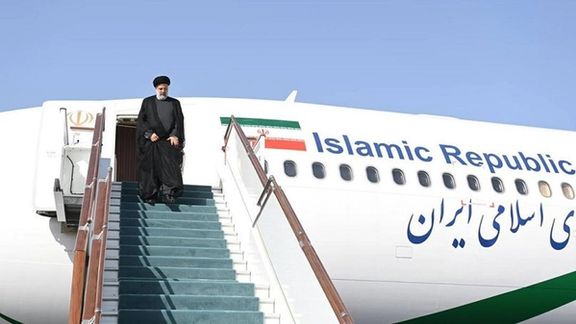
Iranian President Ebrahim Raisi arrived in the Uzbek city of Samarkand on Wednesday for a summit of the Shanghai Cooperation Organization (SCO).

Iranian President Ebrahim Raisi arrived in the Uzbek city of Samarkand on Wednesday for a summit of the Shanghai Cooperation Organization (SCO).
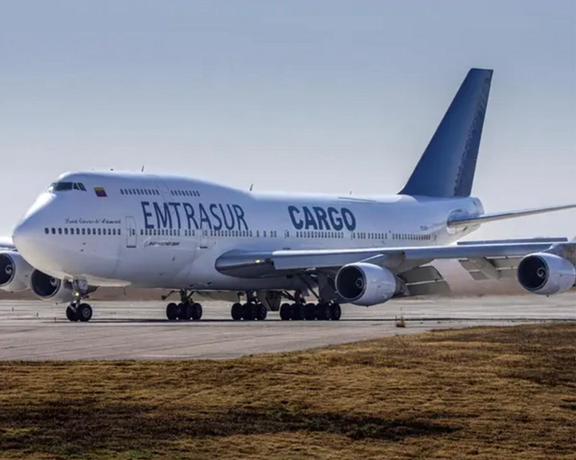
An Argentine judicial chamber has finalized a ruling to allow release of 12 of 19 crew members of a Venezuelan plane grounded on suspicions of ties with Iran’s Revolutionary Guard, a designated terror group.
The Federal Court of Appeals of La Plata in the province of Buenos Aires authorized the 12 crew members' departure on Tuesday and ordered a judge to resolve the investigation into the crew within 10 days.
In August, Federal Judge Federico Villena authorized the departure of 12 of the 19 people who were onboard, ordering four Iranians and three Venezuelans to be retained in Argentina. He said there are still elements to be investigated regarding the Iranian pilot Gholamreza Ghasemi, designated by the Argentine intelligence service as a member of the Revolutionary Guard.
Registered as a Venezuelan cargo plane, the aircraft was previously owned by the Iranian company Mahan Air and transported a group of Iranian officials, including Ghasemi, a senior executive of the airline Qeshm Fars Air and a former board member of Fars Air Qeshm who stands accused of transporting weapons for Hezbollah during the civil war in Syria.
In June, Gerardo Milman, an Argentine lawmaker, told Iran International that Iranians aboard the Venezuelan plane planned “attacks on human targets.” Contrary to Iran’s claim on June 13 that the plane was not owned by an Iranian company, Milman said the pilot was “a senior official of Qods (Quds) force,” Tehran’s extraterritorial intelligence and secret ops outfit listed as a terrorist organization by the United States.
Earlier in September, Captain Ghasemi reiterated the claim that he is a flight instructor and had no ties to the Iranian military except for fighting in the Iran-Iraq War (1980-1988) as a volunteer in the Basij Popular Mobilization Forces.
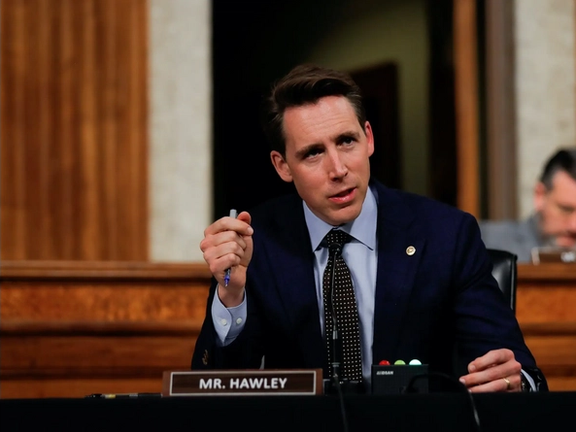
A US Republican lawmaker told Iran International that Washington is not going to get back to any kind of a deal with Iran and should not let Tehran grow its nuclear capabilities.
Senator Josh Hawley (R-MO) told our correspondent Arash Aalaei on Tuesday that “the Biden administration's approach to Iran is totally misguided. We should not consent to giving Iran any more capability to produce anything on the nuclear front.”
Underlining that the United States is not going to get back to any kind of a deal with Iran, he said, “We're going to keep the strings tight; we're going to keep the pressure on. We don't want to see that region become further destabilized."
“Iran getting a track toward a working nuclear program would be deeply destabilizing,” he added.
Casting aspersions on the Biden administration’s foreign policies, particularly about Iran and Russia, he added that Biden’s policies do not “make any strategic sense,” as they are not good for the US’ “energy security or independence” nor they help “in terms of our military posture in that region.”
He stated that the US should help its allies and partners in the Middle East to do more to stabilize the region so that it can “focus on East Asia and problems with China.”
Emphasizing Iran's terrible record on religious liberty and rights for women, he questioned the administration’s logic of helping “the tyrannical regime” in Tehran and further emboldening them. “They are walking towards a path that would be deeply harmful to the region, to religious minorities and to the cause of freedom of worship and faith. It is dangerous.”
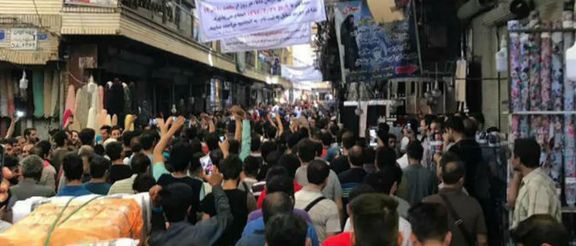
Iran’s government is supposed to double tax collection this year to compensate for lack of oil revenues, putting pressure on businesses that prefer to emigrate.
President Ebrahim Raisi’s hardliner government, that has so far refused to reach an agreement in the nuclear talks with the United States that would lift oil sanctions, has been insisting on collecting more taxes to bridge a budget deficit that is estimated to be at least 50 percent.
Aftab News, a relatively independent website in Tehran, said Wednesday that to compensate for lost oil export revenues the current budget calls for collecting 5.26 quadrillion rial in taxes, (that is 15 zeros).
That is hard to calculate in US dollars since there are a variety of exchange rates in Iran, but the sum is in the neighborhood of $20 billion. That might not seem like a big amount by Western standards, but in rials it is larger than the whole government budget was just three years ago.
Due to a huge fall in rials value, the budget has ballooned from 4.6 to 12 quadrillion rials since 2019.
Davood Manzur, the head of Iran’s tax department recently said that the government has succeeded in collecting 112 percent of scheduled taxes since March 21, the beginning of the Iranian calendar year. The amount cited was around 3 quadrillion rials.
Recently the government has gone after personal bank accounts, saying that if an account has more than 100 deposits in one month totaling to around $1,100, it will be considered tax liable as a commercial account.
Aftab news cited a business leader as saying that Iran has the highest tax collection rate in the Middle East, while Saudi Arabia is establishing tax-free zones to encourage economic growth in non-oil sectors.
While Iran struggles amid continuing US sanctions, with an annual inflation rate of around 50 percent and lack of investments, the growing tax burden is a toxic formula for the private sector.
Donya-e Eghtesad (World of Economy), the best-known business and economy website in Tehran published an article on September 7 about a survey of 40 business leaders and potential about what they thought of the prevailing condition in the country.
An overwhelming majority of 87 percent said they had no clear picture of the future for investments in Iran. Their main concern revolved around decision makers creating “instability”. More than half indicated that they were contemplating to take their capital out of the country, and most have either partially have already moved their businesses to other countries.
A huge exodus of capital to tune of up to $10 billion annually has been taking place, mostly to the United Arab Emirates and Turkey, where Iranians are the largest group of real estate buyers.
The businessmen cited persistent high inflation as a major manifestation of instability, as Iran has been printing money with an accelerated rate since the US imposed sanctions in 2018 after abandoning the nuclear agreement known as the JCPOA.
Higher taxes this year are undoubtedly another manifestation of erratic economic decision making by a government that its own hardliner supporters are now criticizing as inept.
Traditional Bazaar merchants in Tehran and other cities protested in June to the unfavorable economic conditions and specifically to higher taxes.
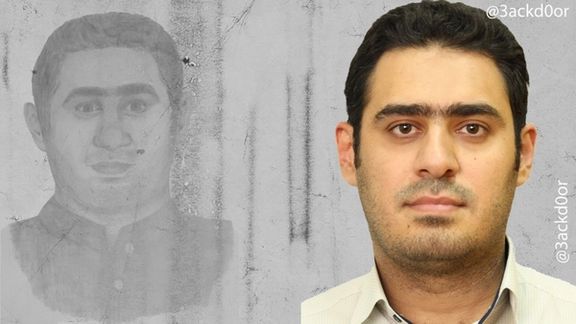
The photo of Reza Salarvand, who leads one of the units of Iran’s Revolutionary Guard’s wing of cyber hackers, has been released to the media.
Last year, Iran International published a facial composite of Salarvand that was obtained from Lab-Doukhtegan (Sealed Lips) hacktivist group, and the new photo – released for the first time by an account called ‘3ackd0or’ on Tuesday – corroborated his identity.
He is the head of the ‘Intelligence Group 13,’ which is apparently a sub-group within the Shahid Kaveh unit, headed by an IRGC cyber warfare commander, Hamidreza Lashkarian (Lashgarian)
Salarvand’s team was in charge of preparing a database of targets for cyberattacks, including cargo ships, gas stations and maritime control centers in the US and elsewhere.
The 30-year-old with a bachelor’s degree in information technology engineering from the South Branch of Tehran’s Azad University with a lower-than-average grade of 13, according to his BS certificate, which was also released by Lab-Doukhtegan.
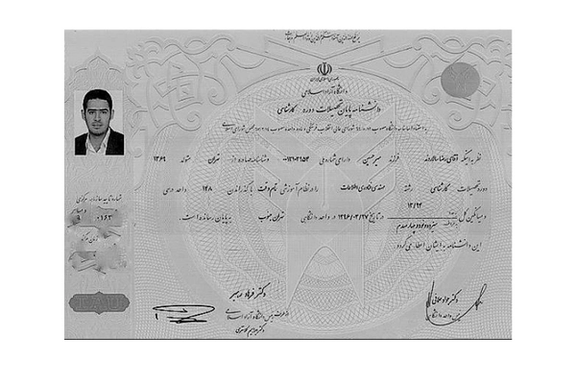
On Monday, Iran International released photos of key Iranian players in global cyberattacks who are affiliated with various government intelligence agencies in Tehran.
Last week, Albania cut diplomatic relations with Iran and expelled its diplomats and immediately its security forces entered the embassy compound looking for evidence.
The United States imposed sanctions on Iran’s intelligence ministry and its minister, with NATO also expressing support for its member state Albania.
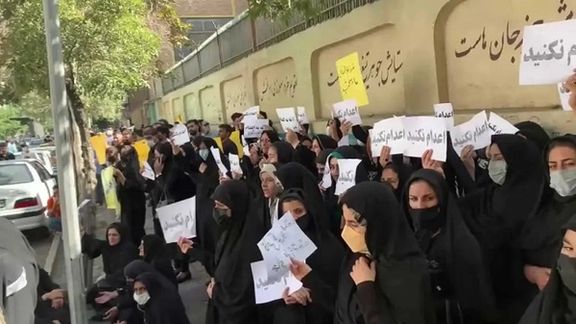
Informed sources told Iran International that Iran's security forces have threatened detained relatives of death row prisoners with prosecution if they protest.
Family members of someprisoners sentenced to death held protest rallies outside the building of the Iranian judiciary for nearly a week but on Saturday and Sunday security forces and plainclothesmen attacked them to end their protest.
At least twenty protesters were arrested, and some were beaten so badly that they had to be taken to hospital for treatment, according to information received by Iran International.
Informed sources say some of the detainees have been forced to sign written pledges promising not to take part in protests and have also been threatened that they will be charged with “assembly and collusion against the regime”, “disturbing public order”, and “insulting top officials” and prosecuted, that can carry long prison terms.
Detainees have also been warned not to speak with foreign-based Persian language media, which authorities always refer to as “hostile media”.
One of the parents of a death row prisoner told Iran International that intelligence agents threatened him with the arrest of his other children and their persecution for participation in the protests although his other children were never involved.
Videos posted on social media last week showed protesters including some children holding placards with words ‘No to Execution’ and ‘No Execution for Drugs’ and chanting ‘Don’t Execute’.
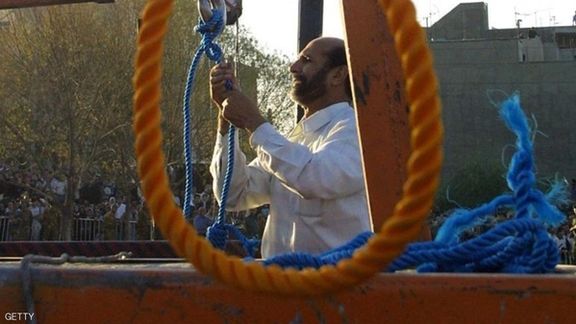
“I stand in solidarity with anguished relatives of death row prisoners in Iran who are protesting bravely to stop the execution of their loved ones. Iran’s authorities must abolish the death penalty, which is the ultimate cruel and inhumane punishment,” Agnes Callamard, secretary general of Amnesty International and former UN Special Rapporteur on Extra-Judicial Executions (2016-2021) tweeted Monday with the Persian hashtags ‘No to Execution’ and ‘Don’t Execute’.
The Islamic Penal Code of 2013 provides for the death penalty for a wide range of offences including murder, drug trafficking, adultery, and homosexuality as well as political crimes.
Most of those executed in Iranian prisons are convicted for drug trafficking or murder but anti-death-penalty activists say the regime uses executions as a political tool of intimidation, especially at times of political crisis.
“There are extensive, vague and arbitrary grounds in Iran for imposing the death sentence, which quickly can turn this punishment into a political tool,” Javaid Rehman, UN Special Rapporteur on the situation of human rights in the Islamic Republic of Iran, told the UN General Assembly in delivering his fourth annual report in July 2020.
“In addition, the structural flaws of the justice system are so deep and at odds with the notion of rule of law that one can barely speak of a justice system,” he said. “The entrenched flaws in law and in the administration of the death penalty in Iran mean that most, if not all, executions are an arbitrary deprivation of life,” Rehman said.
The number of executions has considerably increased in the past few months with most probably hundreds of executions not officially announced.
The US-based HRANA, the news agency of Human Rights Activists, on Monday reported a spate of executions in various prisons across the country in the past few days.
The judiciary this month sentenced two female LGBTQ rights defenders, Elham Chubdar and Zahra Sedighi Hamedani, to death for “promoting homosexuality”.
EU Foreign Policy Chief Josep Borrell’s spokesperson Peter Stano on Tuesday condemned the death sentences passed on LGBTQ activists. "The EU is fundamentally opposed to death penalty at all times and in all circumstances and aims at its universal abolition," he said adding that the EU is also firmly opposed to all forms of criminalization of sexual orientation and gender identity.
Welcomed by Uzbekistan's Prime Minister Abdulla Aripov, Raisi and his accompanying delegation are also scheduled to hold meetings with the SCO's heads of state on the sidelines of the summit. Before embarking on the three-day visit, Raisi said he was going to Uzbekistan at the invitation of his Uzbek counterpart Shavkat Mirziyoyev.
"In the first step of developing the neighborhood policy, we were able to strengthen mutual political trust in the region, and in the second step, we are pursuing the effective role of the Islamic Republic of Iran and its active presence in the region," he said.
Iran has been hoping to become a full member of the Shanghai Organization for many years, and at last year's meeting of the organization, it was agreed that Iran would change its status from an observer member to a permanent member. Tehran started a formal process for accession to the bloc in March, and is expected to complete the accession procedure next year.
Becoming a SCO member helps the Islamic Republic take the advantage of using the infrastructure that exists in Asia and in the neighboring countries, Raisi claimed.
Iran's Deputy Foreign Minister for Economic Diplomacy, Mehdi Safari, said on Wednesday that the status of Iran’s membership will be determined after this trip.
Earlier on Wednesday, government's spokesman Ali Bahadori Jahromi said the draft legislation outlining Iran's membership in the organization had been submitted to parliament for approval.